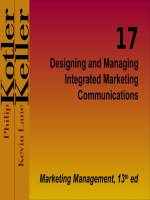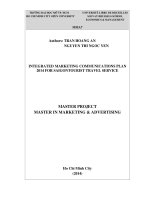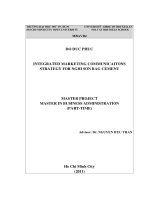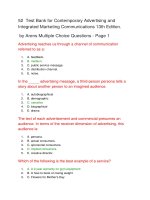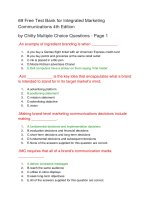individualassignment integrated marketing communications
Bạn đang xem bản rút gọn của tài liệu. Xem và tải ngay bản đầy đủ của tài liệu tại đây (1.73 MB, 18 trang )
<span class="text_page_counter">Trang 1</span><div class="page_container" data-page="1">
MKT 304
INDIVIDUAL ASSIGNMENT
<b>Integrated Marketing Communications</b>
<b>Prepared by Thieu Thi Phuong LyStudent ID HS171109</b>
<b>Class MKT1813</b>
<b>Lecturer Pham Khanh Huyen</b>
</div><span class="text_page_counter">Trang 2</span><div class="page_container" data-page="2">I .The chapter opener discussed the Fiesta Movement social media campaign used by Ford to launch its new Fiesta subcompact car in the U.S. market. Discuss the pros and cons of this program and assess the amount of risk Ford took in allowing the agents to use social media tocommunicate with their friends about the car. (LO1, 2) 3
3. User-Generated Content (UGC)...9
4. Contests and Giveaways...10
5. Buzz Marketing (Creating Mystery)...10
IV. Do you agree with critics who argue that many of the younger people who work in the creative departments of advertising agencies cannot develop ads that connect with older consumers because of the age gap. Do you think advertisers ignore older consumers? Evaluate both sides of this argument. (LO1)………...12
1. Argument in Favor of Age Gap Challenges...12
2. Argument Against Age Gap Challenges...13
V. Discuss how one of the consumer response models presented in Figure 5-3 could be used by a company such as Apple in planning the introduction of a new product such as Ipad...14
</div><span class="text_page_counter">Trang 3</span><div class="page_container" data-page="3"><b>Ford to launch its new Fiesta subcompact car in the U.S. market. Discuss the pros and cons of this program and assess the amount of risk Ford took in allowing the agents to use social media to communicate with their friends about the car. (LO1, 2)</b>
The Fiesta Movement social media campaign launched by Ford to introduce its new Fiestasmall car model in the US market is a groundbreaking marketing effort and has a great impacton the market. This campaign marks a significant shift from traditional advertising methodsand leverages the power of social media and peer-to-peer marketing. In this analysis, we willevaluate the advantages and disadvantages of this campaign.
<b>1. Pros </b>
<b>1.1 Increase brand visibility</b>
“"“Fiesta Movement” which involved enlisting a team of 100 “agents” to drive the newvehicle for six months and participate in monthly challenges that would allow them to shareinteresting content with their friends through social media. .”(Belch & Belch, 2017)The Fiesta Movement significantly increased the visibility and hype around the Ford Fiestabrand. It helped the brand establish a strong online presence and appealed to a younger, tech-
</div><span class="text_page_counter">Trang 4</span><div class="page_container" data-page="4">advertising channels.
<b> 1.2 Authenticity and Credibility</b>
”“Fiesta Movement” which involved enlisting a team of 100 “agents” to drive the newvehicle for six months and participate in monthly challenges that would allow them to shareinteresting content with their friends through social media. ” (Belch & Belch, 2017)By introducing real individuals, called agents, rather than scripted actors, Ford addedauthenticity to its marketing efforts. Agents shared their real-world experiences with theFiesta, making the content more relatable and trustworthy.
<b> 1.3 Cost-Effectiveness</b>
“generate buzz around the redesigned 2014 model with its "Fiesta Movement: A SocialRemix" campaign. Once again, Ford recruited 100 socially vibrant agents and gave themcars to drive and buzz about on social media (Exhibit 5-5).” (Belch & Belch, 2017)The Fiesta Movement provided a cost-effective alternative to traditional advertising. It wasbudget-friendly because the campaign relied on agents to create content, reducing the needfor expensive production and distribution of conventional advertisements. Ford's decision toextend the campaign beyond its initial timeframe demonstrates the value they found in thiscost-effective approach.
<b>1.4 Interactive Engagement</b>
The campaign encouraged direct interaction between agents and potential customers. Agentsengaged with their followers, answered questions, and shared their daily experiences with theFiesta, fostering a sense of community around the product.
<b>1.5 Social Media Reach </b>
</div><span class="text_page_counter">Trang 5</span><div class="page_container" data-page="5">Ford to tap into the vast user bases of these platforms. Content could be easily shared andwent viral on the campaign's social media, expanding its reach even further.
<b>2. Cons</b>
<b>2.1 Risk of negative reviews</b>
By allowing agents to share their honest opinions and experiences, Ford exposed itself to therisk of negative reviews. If agents encountered issues with the Fiesta, they could openly sharetheir dissatisfaction, potentially harming the car's reputation.
<b>2.2 Lack of Control</b>
Ford had limited control over the content created by agents. While this contributed toauthenticity, it also meant that messages and tones could vary widely, sometimes not aligningwith the carefully crafted brand image.
<b>2.3 Misrepresentation</b>
There was a risk that some agents might misrepresent the features, capabilities, orperformance of the car intentionally or unintentionally. This could lead to consumerdisappointment and confusion.
</div><span class="text_page_counter">Trang 6</span><div class="page_container" data-page="6"><b>3. Risk Assessment</b>
Ford undoubtedly weighed the risks associated with the Fiesta Movement campaign. Thedecision to use social media and real people to market the car yielded authenticity andengagement that traditional advertising struggled to achieve. While there was a potential fornegative feedback, the genuine enthusiasm of the agents mitigated some of this risk.Ultimately, the campaign's long-term success depended on Ford's ability to maintainmomentum beyond the initial buzz and turn it into enduring brand appeal.
The Fiesta Movement was a pioneering marketing campaign that showcased thepotential of social media and peer-to-peer support in the automotive industry. Despitecertain risks, Ford's willingness to embrace these risks was rewarded with brandawareness and excitement, highlighting the power of user-generated content inmodern marketing strategies. However, the ultimate success of such a campaignhinges on the company's ability to harness initial enthusiasm and sustain long-termappeal.
<b>II. Discuss some of the ways marketers can deal with communication problems such as mistranslations when developing advertising messages in different languages. (LO1) </b>
When developing advertising messages in different languages, marketers may facecommunication problems such as mistranslations. This can be a significant challenge forcompanies that want to expand their reach to international markets. In this essay, we willdiscuss some of the ways marketers can deal with communication problems such asmistranslations when developing advertising messages in different languages.
One way to deal with this problem is to be aware of the connotations of the words, signs,symbols, and expressions brands use as brand names or logos in various forms of promotion.Relying on images rather than text or copy is a great way to market consumers with different
</div><span class="text_page_counter">Trang 7</span><div class="page_container" data-page="7">cultures and regions and can help decrease mistranslations. Communicating the list ofattributes describing different product qualities that are relevant to a specific language andculture is another way to avoid misconceptions and have an impact on the intended targetaudience.
Another way is to use translators and native-speakers to help guide marketing for a specificproduct line as advertising copy, slogans, images, and symbols do not always transfer wellinto other languages. This is essential for maintaining a company’s image/reputation and abrand’s credibility or image. It’s important to note that using machine translation tools likeGoogle Translate may not always be accurate and can lead to mistranslations. It’s best to useprofessional translation services or hire native speakers who are fluent in both languages.Moreover, it’s important for marketers to understand the cultural differences betweencountries when developing advertising messages in different languages. For example, certaincolors may have different meanings in different cultures. In China, red is associated withgood luck and prosperity, while in Western cultures it’s associated with danger or warning.It’s important for marketers to research cultural differences before developing advertisingmessages in different languages.
Communication problems such as mistranslations can be a significant challenge formarketers when developing advertising messages in different languages. However, bybeing aware of the connotations of words, relying on images rather than text or copy,communicating the list of attributes describing different product qualities that arerelevant to a specific language and culture, using translators and native speakers, andunderstanding cultural differences between countries, marketers can overcome thesechallenges and develop effective advertising messages that resonate with their targetaudience.
</div><span class="text_page_counter">Trang 8</span><div class="page_container" data-page="8"><b>discussion and buzz for their brands. Discuss the pros and cons of these techniques. (LO2)</b>
Word-of-mouth marketing is a powerful tool in today's digital age, as consumers often rely onrecommendations from friends, family, and influencers when making purchasing decisions. Marketers have recognized the value of generating word-of-mouth discussion and buzz to enhance brand visibility and credibility. This will explore various techniques marketers use for this purpose and discuss the pros and cons associated with each.
<b>1. Influencer Marketing</b>
Influencer marketing involves partnering with individuals who have a significant online following to promote a brand or product. This technique has gained immense popularity in recent years.
<b>Credibility: Influencers are seen as experts </b>
in their niches, and their endorsement can lend credibility to a brand.
<b>Reach: Influencers often have a large and </b>
engaged audience, allowing brands to tap into specific demographics.
<b>Authenticity: Well-matched influencers can</b>
create content that feels genuine and relatable, increasing trust among consumers.
<b>Cost: Collaborating with influencers, </b>
particularly those with substantial followings, can be expensive.
<b>Authenticity Concerns: Some influencers </b>
may endorse products solely for financial gain, leading to authenticity issues.
<b>Limited Control: Marketers have limited </b>
control over an influencer's content, which can pose risks to brand image.
</div><span class="text_page_counter">Trang 9</span><div class="page_container" data-page="9"><b>2. Viral Marketing</b>
Viral marketing aims to create content that spreads rapidly and organically through social sharing, resulting in heightened brand exposure.
<b>High Reach: Successful viral content can </b>
reach a massive audience quickly without significant advertising costs.
<b>Cost-Effective: Viral content often spreads </b>
organically, reducing the need for a substantial marketing budget.
<b>Memorability: Viral content tends to be </b>
memorable and shareable, leading to more discussions.
<b>Unpredictability: It's challenging to predict</b>
what content will go viral, even with crafted campaigns.
<b>well-Short-Lived Impact: Viral content often </b>
has a short lifespan, and the buzz may dissipate rapidly.
<b>Risk of Backlash: Controversial or </b>
misunderstood viral campaigns can lead to negative discussions and brand damage.
<b>3. User-Generated Content (UGC)</b>
UGC involves encouraging customers to create and share content related to a brand or its products.
<b>Authenticity: UGC is created by real </b>
customers, providing a genuine perspective on a brand's offerings.
<b>Social Proof: Positive UGC serves as social</b>
proof, influencing potential customers' decisions.
<b>Engagement: Encouraging UGC can foster </b>
customer engagement and build a sense of
<b>Negative UGC: Negative reviews or </b>
content can also spread, potentially harmingbrand reputation.
<b>Inconsistent Quality: The quality of UGC </b>
varies, and brands may not have control over content consistency.
<b>Moderation Challenges: Managing and </b>
moderating UGC can be time-consuming
</div><span class="text_page_counter">Trang 10</span><div class="page_container" data-page="10"><b>4. Contests and Giveaways</b>
Contests and giveaways involve creating promotional events where participants have the chance to win prizes in exchange for engagement with the brand.
<b>Increased Engagement: Contests and </b>
giveaways can boost user engagement as participants share their involvement and invite others to participate.
<b>Data Collection: Brands can collect </b>
valuable customer data through entry forms or registrations.
<b>New Customer Acquisition: Contests can </b>
attract new customers who might not have engaged with the brand otherwise.
<b>Short-Term Focus: Engagement generated </b>
through contests can be short-lived, and participants may lose interest once the contest ends.
<b>Quality vs. Quantity: Brands may attract </b>
participants more interested in winning prizes than in the brand itself.
<b>Resource-Intensive: Running contests and </b>
managing giveaways can be intensive in terms of time and effort.
<b>resource-5. Buzz Marketing (Creating Mystery)</b>
Buzz marketing involves creating anticipation and intrigue around a product or campaign by withholding certain information until a later date.
<b>Anticipation: Creating mystery and </b>
suspense can generate anticipation and excitement among consumers.
<b>Risk of Disappointment: If the mystery </b>
doesn't live up to expectations, it can lead todisappointment and negative discussions.
</div><span class="text_page_counter">Trang 11</span><div class="page_container" data-page="11">finally unveiled, it can lead to extensive discussions and media coverage.
<b>Longer Engagement: A well-executed </b>
mystery campaign can keep audiences engaged over an extended period.
level of mystery without frustrating or confusing consumers can be challenging.
<b>Limited Applicability: Not all products or </b>
services lend themselves to buzz marketing through mystery.
Generating word-of-mouth buzz is an essential component of modern marketing strategies. While these techniques offer various advantages, marketers must carefully consider their pros and cons to choose the most suitable approach for their brand, target audience, and objectives. Successful word-of-mouth marketing requires meticulous planning, execution, and monitoring to ensure that discussions and buzz remain positive and align with the brand's image and goals. Ultimately, the effectiveness of these techniques lies in their ability to create authentic and engaging conversations around the brand
<b>IV. Do you agree with critics who argue that many of the younger people who work in the creative departments of advertising agencies cannot develop ads that connect with older consumers because of the age gap. Do you think advertisers ignore older consumers? Evaluate both sides of this argument. (LO1)</b>
Advertising plays a pivotal role in shaping consumer behavior, influencing purchasing decisions, and conveying brand messages. In this digital age, advertising agencies are increasingly relying on young, creative talents to craft compelling ad campaigns. However,
</div><span class="text_page_counter">Trang 12</span><div class="page_container" data-page="12">connecting with older consumers due to the perceived age gap. This essay will evaluate both sides of the argument, drawing upon relevant references to shed light on this complex issue.
<b>1. Argument in Favor of Age Gap Challenges</b>
<b>Limited Life Experience: Critics argue that younger creatives may struggle to create ads that</b>
resonate with older consumers because of their limited life experience. Older consumers often have distinct values, preferences, and experiences that may not align with the perspectives of younger professionals (Bruce et al., The influence of televised food commercials on children's food choices: Evidence from ventromedial prefrontal cortex activations 2016)
<b>Generational Differences: The generation gap can be a significant barrier to effective </b>
communication. Younger creatives may not fully grasp the cultural nuances, references, and communication styles that appeal to older audiences. This can lead to ads that feel disconnected or irrelevant.
<b>Trends vs. Timelessness: Younger professionals may have a propensity to focus on trendy, </b>
youth-oriented concepts, potentially neglecting the timeless and classic messaging that often resonates with older consumers
<b>2. Argument Against Age Gap Challenges</b>
<b>Fresh Perspective: Younger creatives can offer a fresh perspective and innovative ideas that </b>
may resonate with a broad audience, including older consumers. Their creativity and adaptability can lead to unique and effective campaigns
</div>

